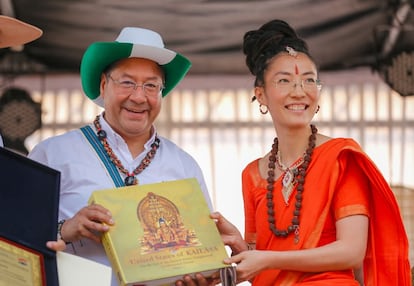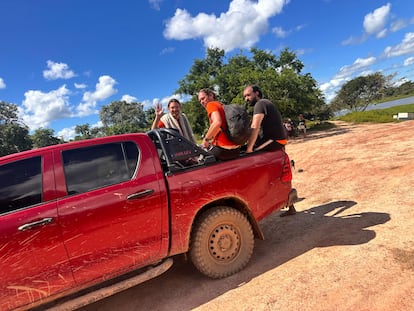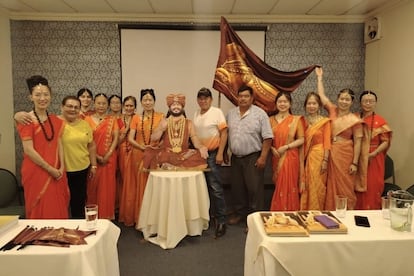Kailasa, the fake country used by phony Hindu monks to try to claim Indigenous land in Bolivia
The affected communities are lashing out at their own leaders for signing land leases worth thousands of dollars with a nonexistent nation that had attempted similar moves in Ecuador and Paraguay


In September 2024, three Irish citizens arrived in the Bolivian Amazon city of Beni posing as Hindu monks. Dressed in orange robes, they presented themselves as protectors of nature, expressing concern over the wildfires that had destroyed more than 10 million hectares the previous year in the Chiquitanía and the Amazon regions. They settled in the municipality of Exaltación, where they offered free yoga therapy and meditation sessions to both urban and rural residents.
A few weeks later, another 17 individuals — of Indian and Chinese origin— followed, entering the community with herbal remedies and promises of food aid. Their strategy, as self-proclaimed delegates of a so-called nation called Kailasa, was to win the trust of locals. Meanwhile, behind the scenes, they were signing lease agreements with leaders of three villages for nearly half a million hectares — an expanse almost five times the size of Bogotá — for just under $200,000.
“The community is upset because their goodwill was taken advantage of. They had been offered medicines and health support, but at no point were they informed about leasing or donating their land,” Justo Molina, president of the Confederation of Indigenous Peoples of Eastern Bolivia CIDOB, tells EL PAÍS.
The organization CIDOB brings together 34 Indigenous groups living in the Chaco and Amazon regions in Bolivia, including the Baure, Cayubaba, and Esse Ejja nations. These were the three nations where the alleged members of the fictitious Kailasa sought to settle and exploit resources, in exchange for preserving endemic biodiversity and land rental agreements that included offers of up to $108,000 annually.
The members of the religious sect, who were detained and later deported from Bolivia on March 24 to Ireland, the United States, China, and Sweden, presented themselves to some Indigenous leaders as ambassadors of Kailasa, the world’s first “sovereign Hindu nation.” They claimed that their homeland had been “lost among the waves of the Indian Ocean, due to the ravages of catastrophic climate change.”
The members said they were victims of political and religious persecution, but insisted this had not stopped them from forming their own constitution, issuing passports and printing currency. In reality, their leader, Nithyananda Paramashivam, is known internationally as a conman and is a fugitive from Indian authorities on charges of violence, torture, and child abuse.
Bolivia was not the only country where they tried to deceive people. Individuals identifying as representatives of Kailasa participated in two sessions at the United Nations in Geneva and were photographed with U.S. congresspeople and senators from other countries.

Before entering Bolivia, the group attempted a similar scheme in Paraguay and Ecuador in 2023. In Paraguay, the Minister of Agriculture and Livestock, Arnaldo Chamorro, was dismissed after signing a diplomatic agreement with the United States of Kailasa. In Ecuador, they held a meeting with then-Environment Minister, Sade Fritschi Naranjo.
“In Bolivia, they changed their strategy a bit and didn’t approach the authorities — instead, they went directly to the Indigenous communities. Unfortunately, they sweet-talked them with annual contracts ranging from $60,000 to $100,000,” says local journalist Iván Paredes, who investigated the case.
Indigenous leaders in the eye of the storm
The members of the fake nation Kailasa also saw an opportunity in the autonomy that Indigenous communities in Bolivia enjoy over their land, justice systems, and resources, through the framework of the Original Communal Territories (TCOs). This allowed them to negotiate directly with locals without involving higher state authorities. However, according to the Bolivian Constitution, TCOs are collectively owned lands for the exclusive use of the communities that inhabit them, and therefore cannot be transferred.
“How could Indigenous leaders fall into this trap? With these agreements, they not only attacked their own people but also violated the sovereignty of the Bolivian state. They have no legal authority to lease or transfer these lands, and by doing so, they have committed illegal acts that must be investigated by the proper authorities,” stated Congresswoman María René Álvarez in a Facebook post in March. The lawmaker launched an investigation later that month, along with the Beni Department Prosecutor’s Office, against the Indigenous signatories for “land trafficking.”
The contracts negotiated with representatives from the three Indigenous nations were signed between October and November of last year. The document concerning the Cayubaba people offered Kailasa members not only “full sovereignty and autonomy within the territory to establish their administrative, legal, and economic systems” but also full control over the airspace and any resources “above or below the ground.” In exchange, they would receive an annual payment of $55,800 and a promise to preserve the environment.
In the case of the Baure people, one of the leaders who agreed to the contract, Pedro Guasico Durán, reportedly threatened a journalist from the national outlet El Deber after she revealed details of the agreement, which offered $108,000 in exchange for land, according to the reporter’s account. For the Esse Ejja territory, an offer of $28,107 was allegedly made.
Despite repeated attempts by EL PAÍS to contact the leaders who signed the contracts, they declined to comment. “These leaders are now outside the TCO; they’ve vanished, and the community is furious. They want to apply community justice. It’s a bit dangerous for them to stay,” says Molina, from CIDOB. “It’s unacceptable that our own brothers and sisters are handing over our lands — lands we fought so hard for against the state. And to make it worse, in our name.”
Molina says that he had also been contacted by Kailasa “ambassadors,” but never met with them. Nonetheless, members of the group were present at CIDOB’s anniversary event last October, where Bolivian President Luis Arce was photographed alongside one of their members.
At the end of March, the Esse Ejja people issued a collective statement expressing regret that some of their representatives had signed the document. “Our nation was caught off guard, pressured, and manipulated by this group, which acted in bad faith, presenting itself with a misleading and confusing message, and taking advantage of our hospitality and good faith as a people.”
However, they defended their leaders, stating they had made a mistake “from a position of vulnerability, in the face of a proposal that was not fully understood, and in a context where material need was used as a tool of pressure.”

Politicization of Indigenous organizations
The Kailasa case is yet another example of how defenseless Indigenous communities are in the face of encroachment on their lands — whether by mining operations or illegal logging. “There is no full state presence in our territories. The needs are great, and that makes us vulnerable to all kinds of fraudsters. Sometimes, it’s our own Indigenous brothers and sisters who are involved in this land trafficking,” says Molina.
Adding another layer to the issue of Indigenous land rights is the deep politicization that has taken hold within the organizations and unions that administer and represent these communities. As a result, two parallel CIDOBs have been formed: one supported by the ruling party and the other by the opposition. Each sends its own delegates to the Latin American regional body, the Coordinator of Indigenous Organizations of the Amazon Basin (COICA), and each partially represents their territories.
Last Wednesday, India’s Ministry of External Affairs spokesperson Randhir Jaiswal distanced the country from Kailasa in a press conference: “As far as the issue of fake guru is concerned, he is a private person. He speaks for himself.”
Meanwhile, Bolivia’s Foreign Ministry issued a statement on March 21 clarifying that it holds no diplomatic relations with the fictitious nation.
Sign up for our weekly newsletter to get more English-language news coverage from EL PAÍS USA Edition
Tu suscripción se está usando en otro dispositivo
¿Quieres añadir otro usuario a tu suscripción?
Si continúas leyendo en este dispositivo, no se podrá leer en el otro.
FlechaTu suscripción se está usando en otro dispositivo y solo puedes acceder a EL PAÍS desde un dispositivo a la vez.
Si quieres compartir tu cuenta, cambia tu suscripción a la modalidad Premium, así podrás añadir otro usuario. Cada uno accederá con su propia cuenta de email, lo que os permitirá personalizar vuestra experiencia en EL PAÍS.
¿Tienes una suscripción de empresa? Accede aquí para contratar más cuentas.
En el caso de no saber quién está usando tu cuenta, te recomendamos cambiar tu contraseña aquí.
Si decides continuar compartiendo tu cuenta, este mensaje se mostrará en tu dispositivo y en el de la otra persona que está usando tu cuenta de forma indefinida, afectando a tu experiencia de lectura. Puedes consultar aquí los términos y condiciones de la suscripción digital.








































